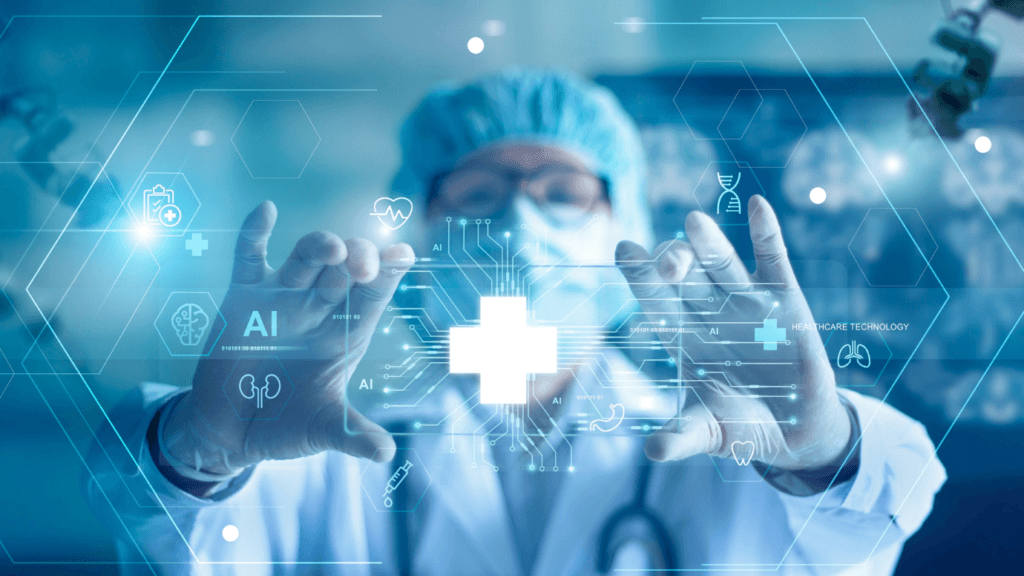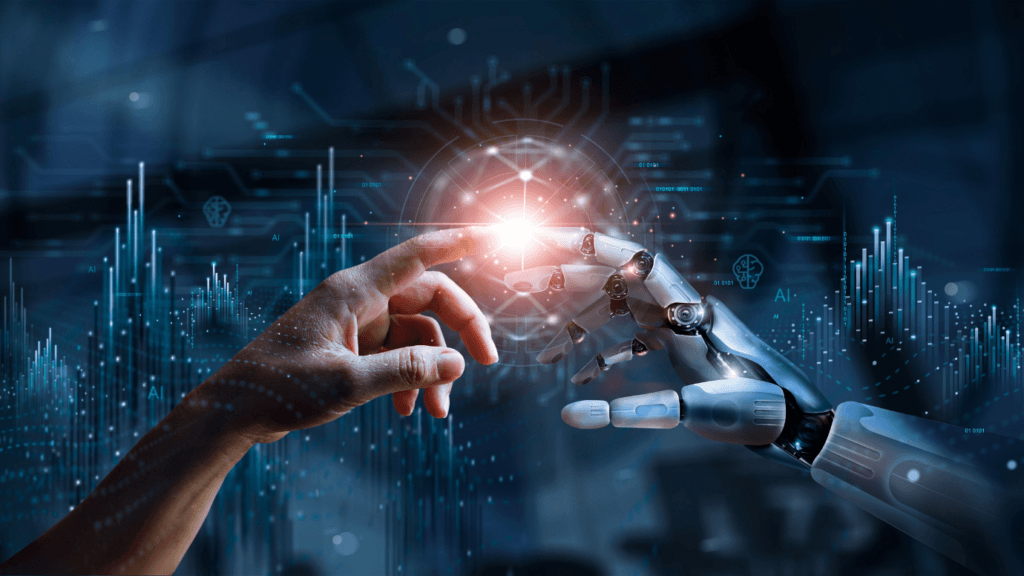AI in Healthcare Statistics: The Rise of Artificial Intelligence in the Health Industry

Artificial intelligence (AI) is changing the game in many industries, and healthcare is no exception. From helping doctors diagnose diseases more accurately to making patient care more personalized, AI is proving to be a powerful ally in improving health outcomes.
Imagine a world where your doctor can predict potential health risks based on vast amounts of data or where treatments are designed just for your unique needs. That’s the kind of change AI in healthcare statistics is bringing to the table.
According to the numbers…
- The AI in healthcare market is estimated to grow to $187.95 billion by 2030.
- A fifth of healthcare organizations have already adopted some form of AI.
- AI could reduce the cost of discovering new drugs by 70%.
- Predictive AI tools could reduce hospital admissions by half.
But why should we care about all this? Simply put, AI in healthcare has the potential to make things better for patients, doctors, and even the overall system. Diving into the statistics and stories behind this trend gives us a clearer picture of where things are headed and how these changes might benefit our daily lives.
Let’s dive in and uncover the impact of AI in the world of healthcare.
Is there a Market for Artificial Intelligence in the Healthcare Industry?
Artificial intelligence isn’t a fresh concept; it’s been a subject of exploration and imagination for decades. However, a combination of factors influenced its presence in healthcare. These include exponential data growth, the advent of powerful computing, and a rising demand for personalized care.
So… when did healthcare professionals and technologists begin to recognize the potential synergy between AI and medical services?
The Onset of Big Data in Healthcare
Around the late 2000s and early 2010s, the healthcare industry began generating massive amounts of data. This surge was largely thanks to the digital transformation of health records. In the U.S., for instance, the adoption rate of basic Electronic Health Record (EHR) systems grew from 9% in 2008 to 84% by the end of 2015. With this vast accumulation of data came the challenge of storage, analysis, and utilization. AI, with its capacity to process and analyze large datasets quickly, became the natural choice to handle this data deluge.
The Computing Revolution
The last decade witnessed an explosion in computing capabilities. We can now practically execute AI algorithms that were previously only theoretical. The power of cloud computing made it possible to run intricate algorithms. This helped to process complex medical data like imaging and genomics.
Demand for Personalized Care
Personalized medicine has emerged as a significant trend in the 21st century. According to a report by PricewaterhouseCoopers, the market for personalized medicine is expected to grow to $232 billion by 2026. This surge is driven by a consumer demand for tailor-made healthcare solutions, and AI, with its ability to parse through individual data for custom insights, serves as a key player in this domain.
But why is AI’s role in healthcare so relevant today? The answer lies in the numbers. For instance, a study by Nature Medicine in 2020 found that AI algorithms, when used for screening certain conditions, could match or even surpass the accuracy rates of human professionals. This type of evidence reinforces the notion that AI, when carefully integrated into the healthcare landscape, can aid in early diagnosis, reduce human errors, and contribute to overall better patient outcomes.
As we continue to grapple with healthcare challenges, be it in managing chronic diseases, addressing global pandemics, or ensuring healthcare access for all, the relevance of AI in shaping solutions becomes undeniable. It’s not just about technology; it’s about enhancing human lives and health experiences.

Is AI Healthcare the New Normal?
As technology continues to evolve and intertwine with our daily lives, it’s so important to pause and imagine what the future might hold—especially in an area as pivotal as healthcare.
AI’s potential in healthcare isn’t just about crunching numbers or quick data analysis; it’s about reshaping the core of how we approach wellness, disease, and the entire patient journey.
Let’s take a brief journey into a world where AI is an integral component of our healthcare system.
Predictive Health Monitoring
Imagine wearables that don’t just count your steps or monitor your sleep but use AI to predict potential health issues based on your vitals, habits, and other data. These devices could give early warnings for conditions ranging from dehydration to heart irregularities, allowing for early intervention.
Virtual Health Assistants
Your 24/7 health companion could be a virtual assistant, constantly learning about you. It could remind you to take medications, schedule your health check-ups based on AI-driven predictions, provide first aid guidance, or even offer mental health support during stressful times.
Personalized Treatment Plans
No more one-size-fits-all. With the help of AI, medical professionals can design treatment plans tailored to an individual’s genetic makeup, lifestyle, and specific needs. This means more effective treatments with fewer side effects.
Enhanced Medical Imaging
Diagnostics will reach new levels of precision as AI can help identify anomalies in X-rays, MRIs, and other imaging techniques that might be too subtle for the human eye. This could lead to earlier detections of diseases like cancer, increasing the chances of successful treatment.
Remote Patient Monitoring
Especially relevant for the elderly or those in remote areas, AI can aid in telemedicine. Sensors and smart devices in homes could monitor vital signs and alert medical professionals to anomalies, reducing hospital readmissions and ensuring continuous care.
Streamlined Administration
On the backend, hospitals and clinics will benefit from AI-driven administrative tools that handle everything from patient appointment scheduling to predictive analysis of medical supplies, ensuring facilities are always prepared.
Health Education and Training
AI can revolutionize medical training, offering simulated environments for surgery, diagnostics, or patient care scenarios. This allows healthcare professionals to practice, learn, and refine their skills in a risk-free environment.
While these possibilities paint an optimistic picture of the future, it’s important to approach them with caution and ethical considerations, too. The integration of AI in healthcare raises questions about data privacy, job displacement, and the importance of human touch in care.
Uses of AI in Healthcare
Today, the influence of Artificial Intelligence in healthcare is continuing to grow, touching a wide array of areas.
Radiology, for instance, stands at the forefront with algorithms adept at identifying abnormalities in X-rays, CT scans, and MRIs, sometimes with precision equalling or surpassing seasoned professionals. 75.7% of radiologists considered AI-based algorithmic results reliable. Conditions such as lung cancers and tuberculosis are now being detected with the aid of these AI systems and 65% of US adults want AI to be used in their cancer screening.
In the world of pharmaceuticals, drug discovery has been revolutionized. The global AI in pharma market size grew from $1.24 billion in 2022 to $1.64 billion in 2023 at a compound annual growth rate (CAGR) of 32.8%. Traditional research, known for its time-consuming and costly nature, is now streamlined as AI steps in to analyze intricate biochemical interactions. This not only speeds up the identification of potential drug compounds but also significantly reduces development costs.
But AI’s strength isn’t limited to just diagnosis or research. When it comes to patient care, doctors now have AI-backed decision support systems at their fingertips, offering treatment suggestions based on a mix of patient data and extensive medical literature. This tailored approach ensures that healthcare providers give patients the care best suited to their unique profile.
In administration, healthcare facilities have started harnessing the power of AI to enhance operational efficiency. AI is streamlining simple tasks like managing patient appointments and optimizing staff schedules, as well as more complex ones like predicting patient inflow.
You also can’t miss the growing number of chatbots and virtual health assistants in the medical world. Serving as the first point of contact, these AI-driven entities are making preliminary diagnoses and general health inquiries more accessible than ever. The global healthcare chatbots market accounted for $116.9 million in 2018 and is expected to reach $345.3 million by 2026, registering a CAGR of 14.5% from 2019 to 2026.
Hospitals are also using AI’s predictive analytics capabilities to forecast patient admissions, aiding in efficient bed management. Wearable health devices, another significant development, incorporate AI to analyze data, moving beyond just tracking fitness metrics. They are now monitoring vital signs, evaluating sleep patterns, and alerting users about potential health concerns.
Lastly, AI is shaping the growing field of personalized medicine. By delving into a patient’s genetic profile, AI provides invaluable insights, enabling medical professionals to customize treatments that align perfectly with the individual’s genetic makeup.
In essence, AI’s footprint in healthcare is expanding. Its current applications are a precursor to the profound impact it could deliver in the coming years.

Artificial Intelligence Health Support Creates Time Savings
Time is always ticking in healthcare, where quicker decisions often lead to better outcomes. AI is helping reshape the sector by dramatically enhancing time efficiency in several areas:
- Faster Diagnostics: AI tools, as highlighted by the Journal of the American Medical Association (JAMA), can detect conditions like breast cancer in mammogram images as quickly and accurately as top radiologists. This speed enables faster treatment initiation.
- Smoother Administration: Admin tasks, from paperwork to scheduling, are streamlined with AI. Accenture suggests that AI can halve the time spent on some of these processes, leading to smoother hospital operations.
- Quicker Drug Development: The traditional years-long drug development process is getting a boost from AI. As noted by the MIT Technology Review, early stages of AI-assisted drug discovery can be cut from years to just months.
- Instant Patient Interaction: Chatbots and virtual assistants provide instant answers, reducing patient wait times when seeking basic information or advice.
- Proactive Care: AI’s predictive tools spot potential health issues early, decreasing the need for extended treatments or hospital stays.
In essence, AI isn’t only enhancing healthcare quality—it’s also ensuring patients and providers save crucial time, ideally leading to swifter, more efficient care overall.
How the Healthcare Market will Change with Artificial Intelligence
Artificial Intelligence isn’t merely integrating into the healthcare market; it’s becoming a transformative force, reshaping many facets of the industry. Let’s delve into the potential shifts, improvements, and challenges we might see as AI becomes more prevalent.
What Might Change and Improve
- Cost Efficiency: By automating administrative tasks and optimizing resource allocation, AI can significantly reduce operational costs. Moreover, with improved diagnostics and predictive care, the costs associated with prolonged treatments and hospitalizations may decrease.
- Global Reach: AI-driven telemedicine can bridge the gap between urban healthcare hubs and remote or underserved regions.
- Personalized Care: Gone will be the days of a one-size-fits-all approach. With AI analyzing individual genetic profiles and personal health histories, treatments will become highly customized, leading to better patient outcomes.
- Data-Driven Insights: With AI continually analyzing vast amounts of medical data, healthcare providers will gain better insights into disease patterns, treatment outcomes, and patient needs, facilitating more informed decisions.
- Innovative Treatments: With AI aiding drug discovery, the market might see a surge in novel treatments and medications that were previously inconceivable or deemed too time-consuming to develop.
Potential Setbacks
- Data Privacy Concerns: With AI algorithms requiring extensive data to operate, concerns about patient data privacy and misuse become more pronounced. Trust will be crucial, and strict regulations will be needed to ensure data protection. 37% of Americans think using AI in health and medicine would make the security of patients’ records worse.
- Job Displacement: While AI can handle many tasks, there’s a looming concern about job losses, especially in administrative roles. The industry will need to find a balance and perhaps emphasize the roles that require a human touch.
- Over-reliance: An over-dependence on AI tools could risk missing out on the intuition and emotional intelligence human healthcare professionals bring to the table. 60% of US adults feel ‘uncomfortable’ with healthcare providers relying on AI, so ensuring AI complements rather than replaces human expertise will be essential.
- Economic Polarization: While AI can democratize healthcare access, there’s a risk that only wealthy institutions or regions might be able to afford the initial investment in advanced AI tools, widening the gap between rich and poor healthcare facilities.
As AI solidifies its position in the healthcare market, the industry will witness groundbreaking advancements. At the same time, new challenges will emerge. Navigating this new era will require a balanced approach, always keeping patient wellbeing at the forefront.
The Artificial Intelligence Healthcare Market for Mental Health
Artificial Intelligence’s entry into mental healthcare promises to reshape interventions and treatments. Here’s a snapshot of AI’s potential impact, as well as the challenges it might pose in this domain.
Benefits of AI in Mental Health
- Early Detection: AI tools can analyze digital behaviors, like typing patterns or voice tones. This can hint at potential mental health issues and facilitate timely interventions.
- Improve Adherence: Follow-up and guidance by AI outside of therapy sessions could offer more support than the clinician could directly provide, thus helping patients stay consistent with treatment plans outside of their sessions. A study showed that using artificial intelligence in behavioral health treatment can effectively help patients adhere to evidence-based care activities, using homework given to patients to track adherence.
- Immediate Assistance: AI-driven chatbots can offer on-the-spot conversations, acting as a bridge until individuals seek human professional help.
- Tailored Therapies: AI can personalize therapeutic activities based on individual responses, making interventions more effective.
- Enhancing Traditional Methods: AI can assist therapists by providing insights from patients’ digital interactions, leading to more informed therapeutic strategies. Additionally, the combination of AI with Virtual Reality can create controlled therapeutic environments for treating phobias or traumas.
Challenges to Consider
- Data Privacy: Protecting deeply personal mental health data from misuse is crucial.
- Risk of Over-reliance: Depending solely on AI tools can sideline the essential human connection vital in mental health care.
- Misdiagnosis Concerns: AI, while powerful, may risk misinterpreting or over-diagnosing based on patterns.
- Accessibility Issues: Those with limited tech access, especially in low-income areas, might miss out on AI’s benefits in mental healthcare.
AI’s introduction to mental healthcare can be transformative, but its integration requires a mindful approach that prioritizes patients’ well-being.
Long-Term Effects of Artificial Intelligence in the Health Market
It’s clear that Artificial Intelligence is reshaping healthcare. It’s promising greater operational efficiency from streamlined patient scheduling to improved supply chain management. Enhanced by AI’s data analysis, healthcare decisions will become more precise, rooted in comprehensive insights.
Furthermore, AI’s telemedicine and diagnostic tools are extending quality care to remote and underserved areas. The industry is also shifting its emphasis from reactive treatments to proactive prevention due to AI’s predictive capabilities.
However, this transformation does not come without its challenges. Ethical dilemmas around data privacy and the role of human judgment will rise. The healthcare job landscape will evolve, demanding professionals to meld tech knowledge with empathy. Additionally, as AI tools multiply, maintaining consistent healthcare standards will be paramount.
As we stand on the brink of this new era, a collaborative and thoughtful approach will be key to harnessing AI’s potential while safeguarding the values and principles that form the foundation of healthcare.
emagineHealth is the digital-first, AI-powered agency for healthcare and life sciences. Let’s work together to maximize the results of your digital marketing initiatives.

Recruitment Marketing for Healthcare & Life Sciences
In this brand new ebook, emagineHealth outlines the critical steps you can take now to attract and retain the employees you want and need in the midst of this talent crisis.